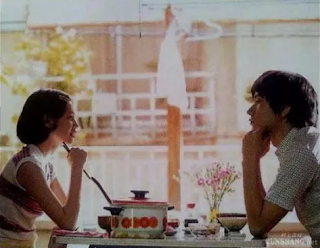As Murakami is known to be an avid reader of Western
literature, he seems to be heavily influenced by it. In fact, quite
a few Western classics appear in his work Norwegian Wood and many
compare Norwegian Wood to J.D. Salinger’s Catcher in the Rye,
calling his work the Japanese version of it. However, my interest was directed
more to the protagonist’s favorite book, The Great Gatsby. Why is it
Toru’s favorite book? How is The Great Gatsby relate to the characters
in the book? These are the questions I would like to explore in this reading journal.
First of all, I believe Toru’s
favorite book is The Great Gatsby because he admires and respects Gatsby.
Norwegian Wood is set in the 1960’s Tokyo when Japanese students were
protesting against the established government. Toru thought these protests were
hypocritical and amounted to nothing. All he really seems to truly care about
in most of the novel is this mysterious and scarred girl Naoko. Similarly,
Gatsby’s driving force for everything is his love for the charming Daisy
Buchanan. The Great Gatsby is set in the roaring 20’s, the Jazz Age, the
age of outer
extravagance and glory hiding the
underlying superficiality the culture experienced. Materialism ensued and screamed “money buys class.” Rather than
protesting or going against this reality, Gatsby makes use of it, creating this artificial world of “Jay Gatsby” by bootlegging and using money
to create for himself a reputation of wealth by throwing absurdly extravagant
parties and living in a huge mansion. However, unlike the typical rich class at that time leading empty lives of
extravagance devoid of purpose and meaning, Gatsby had love as a driving force
for his every action. Everything he did was to get the love of his life, Daisy.
Toru loves this book because Gatsby is titled “great” for the noble motivation
of his actions. Through the desire of love, Gatsby turned his dreams into a
reality regardless of whether he actually succeeded or not.
Yet, one question to ask
ourselves, is Toru’s love, Naoko, worth waiting for? I think not. It’s Gatsby’s
disillusionment all over again. To Gatsby, his love Daisy is the pinnacle of
perfection, the epitome of beauty, love, and charm. Before the war, he and
Daisy were lovers, and Daisy promised she’d wait for him when the war begins. However,
in 1919 she marries Tom Buchanan, a man with a stable aristocratic background
and class. Gatsby then dedicates his life to winning Daisy back by gathering
wealth by illegal means. However, was Daisy really worth all of Gatsby’s
dedication? Yes, Daisy is lovely, charming, and attractive. At the same time,
she is empty, fickle, and loves money and extravagance. In the end, when Gatsby
takes the blame for Daisy running over Myrtle, what does Daisy do? She walks
away, running away on a vacation with her wealthy husband and tries to forget.
Likewise, Toru tries to win Naoko’s true love. He constantly asks Naoko to live
with him and pursue a life together. However, due to her continued attachment
to the deceased Kizuki and her “deeply flawed” nature, she avoids commitment.
Naoko is indeed beautiful and scarred, but Toru’s efforts to heal her scars
seem futile. Like Daisy, Naoko, buried too deeply in the traumas of her past
and still in love with Kizuki, decides to commit suicide without any explanation
to Toru, giving Toru nothing but deep pain and unanswered questions. Toru’s
love and dedication wasn’t enough for her.
Perhaps Toru can also be
titled “great” for his love for Naoko. However, unlike Gatsby, he has a chance
to have a happy ending and redirect his love to someone more deserving. Someone
who truly loves him back and will commit to him. Will he forget his past scar,
Naoko, and succeed in giving and receiving that sacred emotion of love? Or will
he be just another Naoko to Midori and set off a vicious cycle?



No comments:
Post a Comment